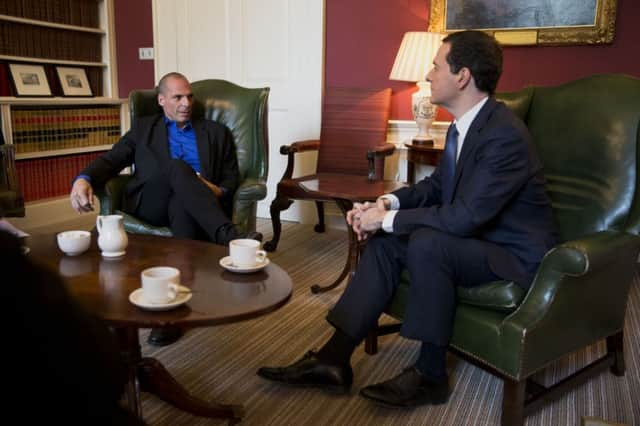‘There’s just a one in five chance of Grexit’


Bill O’Neill, the head of investment office in the UK at Swiss wealth manager UBS, told The Yorkshire Post that he expects Greece to agree a deal with euro zone finance ministers by June at the latest, after a period of tough negotiations.
Mr O’Neill, who was in Leeds to speak at a forum, also predicted that UK interest rates could start to rise by November this year.
Advertisement
Hide AdAdvertisement
Hide AdGreek Finance Minister Yanis Varoufakis is heading for a showdown with euro zone finance ministers after his new leftist-led government won a parliamentary confidence vote for its refusal to extend an international bailout. Last month, before he took office, Mr Varoufakis insisted that a “Grexit” - a Greek exit from the eurozone - was not on the cards.
Mr O’Neill said: “I have to say, we’re only looking at a 20 per cent probability of Grexit - so it’s only a one in five chance. The negotiation will be very, very bruising but by May-June a deal will be done between Greece and with the Europe group of finance ministers.”
Mr Varoufakis has proposed a six-month transition in which Greece would be allowed to issue more short-term debt, receive the proceeds of ECB holdings of Greek bonds and tap unused bank rescue funds while renegotiating its debt. Athens would swap its euro zone loans for GDP-linked bonds and its ECB-held debt for interest-bearing perpetual bonds with no reimbursement date. EU officials have said the most Greece can expect is a further extension of the repayment deadline for its euro zone loans, a lower interest rate and perhaps a prolonged moratorium on debt service payments, in return for continued reforms under external supervision.
Mr O’Neill was bullish about prospects for the UK, despite the uncertainty caused by the looming General Election.
Advertisement
Hide AdAdvertisement
Hide AdHe added: “The economy is growing above trend. The unemployment rate has continued to decline. Average earnings are now rising in real terms for the first time in six years. Employment growth is running at the strongest levels in over 20 years.”
Earlier this week, official figures were released which showed that industrial output slowed further at the end of last year, adding to signs that Britain’s economic recovery lost some pace as 2014 came to a close. However, Mr O’Neill said: “If there’s been a missed beat, it’s been very slight. All the indications are the economy may re-accelerate supported by better news in the euro zone. because that’s the other story as well.
“In the last month or so, the news in the euro zone has begun to improve..There’s the huge effect of the drop in oil prices which will add possibly as much as 0.5 per cent GDP to the UK economy, from a base that was already quite strong.
“We’re looking for a rebound (over the oil price) towards 70 (dollars a barrel) by the end of the year. That would still leave a very substantial cut in place, relative to where we were with the average base in 2014. That’s coming on top of an improved prediction for the banks..record lows in terms of fixed rate mortgages and real earnings rising for the first time in six years. That’s a very positive mix for the UK.”
Advertisement
Hide AdAdvertisement
Hide AdHe said UK interest rates could start nudging forward in November.“If the US hikes in the middle of the summer, the focus will immediately move to the MPC (Monetary Policy Committee), but the key story is the build up of domestic inflation pressure...But the global environment for inflation itself is much weaker than anybody would have envisaged six to nine months ago.”